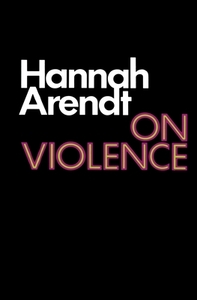Take a photo of a barcode or cover
challenging
informative
slow-paced
Understand a third to half of it maybe 😂 I guess I didn’t try all that hard to be fair
But there are some reflections on violence and power that resonate with national and global political today too.
But there are some reflections on violence and power that resonate with national and global political today too.
dark
informative
reflective
tense
fast-paced
challenging
fast-paced
challenging
informative
reflective
medium-paced
Moderate: Racism
challenging
reflective
medium-paced
reading arendt for the first time is such a new experience for me… and i’d give it a 5/5 because i really enjoy her arguments, her criticisms, and even her doubts… really mind opening (in the context of her theorizing on violence and power). honestly, i’d love to talk more about this topic, but let’s keep it simple.
a lot of people tend to glorify violence like it’s the only way to reach their goals, especially in politics or revolutions. modern revolutionaries (like mao or the new leftists of the 20th century) treat violence as the source of power, following slogans like, “power grows out of the barrel of a gun”. the shift toward glorifying violence is not really a product of theory (like marxism or hegelianism). it comes from historical experience, specifically, the massive upheavals of the 20th century (e.g., colonial violence, world wars, fascism, etc.). that experience gave violence a new emotional and power which earlier generations never had to grapple with. but arendt doesn’t see it that way. violence isn’t the same as power, and when people start using violence, it often shows that they’re losing real power or can’t hold on to it anymore. things have changed. violence isn't just something extremists believe and it’s becoming mainstream among frustrated young people.
arendt sees this as a sign of political decay, when people stop reasoning and start fighting with slogans and rage. the new radicals worship violence in a way that’s closer to fanon’s existentialism than to marx’s materialism. they love to use marxist language (talking about oppression, class struggle, etc.) but at the same time, they are obsessed with violence as the main tool for change which is not really marx’s idea. it’s so refreshing how she calmly criticizes sartre, fanon, and the new left without being mean and pointing out their contradictions and unrealistic ideas.
and what’s interesting is how arendt traces the idea of progress. she herself isn’t entirely sure why people today still hold on so tightly to these outdated 19th-century ideas (history is always moving forward, always improving, and that even conflict and violence are just temporary steps toward a better future) even tho times have changed. from pascal and fontenelle’s accumulation of knowledge, to lessing’s education of mankind, then proudhon’s endless progress and marx (following hegel) that every society contained the seeds of its successor.
what is clear is that many political thinkers from different ideologies agree on one thing that violence is just the most extreme form of power. thus, arendt says that the answer depends on how we define “power”. power is central and essential to government, but violence isn’t. violence is not a necessary part of what makes a government function. violence is just a tool, only makes sense when it’s used for a specific goal. it needs justification (a reason or purpose, like in self-defense or urgent situations where immediate action is needed). violence doesn’t restore real power it actually leads to weakness in the long run because violence destroys legitimacy. arendt sees political power as something that comes from people acting together in agreement and support (action, participation, consent, and dissent) not violence.
i also find the way arendt looks at how thinkers like mill, weber, jouvenel, voltaire, and others define power really interesting. she compares their ideas in such a thoughtful way. she’s trying to clear up our political language and thinking. and her writing is so engaging. arendt is frustrated that political language seems to be misinterpreted. words like power, force, violence, and authority actually mean different things, and we need to be precise when talking about politics. she says getting these words right is not just about using correct language but also about understanding history and how political ideas have developed over time.
Libro denso, profondo e molto attuale - mi ha fatto pensare anche alla corrente situazione russo-ucraina, per dire
Alcuni ragionamenti potrebbero essere un po' datati, come la lapidaria sfiducia per il progresso tecnologico, ma del resto Arendt ha visto la guerra, lo sterminio nazista e (soprattutto) l'atomica; altri, invece, sono illuminanti, come quello sul razzismo (anche se, a tratti, la stessa autrice sembrava un po' razzista, quantomeno nella formulazione) o sul pessimismo delle nuove generazioni, che sentono il ticchettio della bomba che annullerà il loro futuro. Insomma, una posizione decisamente agli antipodi rispetto a quella di Hegel
Contiene parecchie riflessioni interessanti e offre altrettanti spunti di lettura, soprattutto Fanon, che voglio assolutamente approfondire
Alcuni ragionamenti potrebbero essere un po' datati, come la lapidaria sfiducia per il progresso tecnologico, ma del resto Arendt ha visto la guerra, lo sterminio nazista e (soprattutto) l'atomica; altri, invece, sono illuminanti, come quello sul razzismo (anche se, a tratti, la stessa autrice sembrava un po' razzista, quantomeno nella formulazione) o sul pessimismo delle nuove generazioni, che sentono il ticchettio della bomba che annullerà il loro futuro. Insomma, una posizione decisamente agli antipodi rispetto a quella di Hegel
Contiene parecchie riflessioni interessanti e offre altrettanti spunti di lettura, soprattutto Fanon, che voglio assolutamente approfondire
challenging
informative
reflective
medium-paced
challenging
slow-paced
reflective
medium-paced




